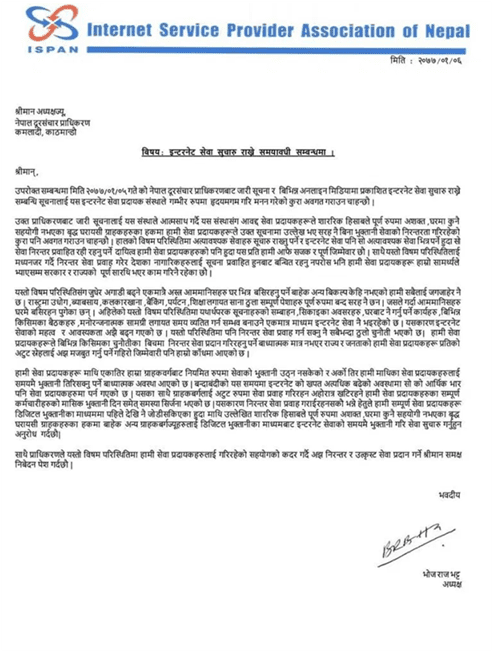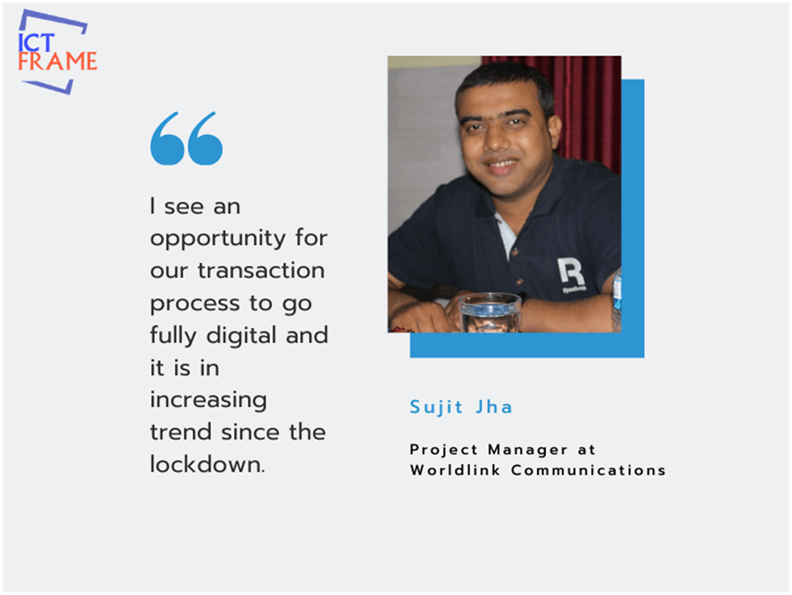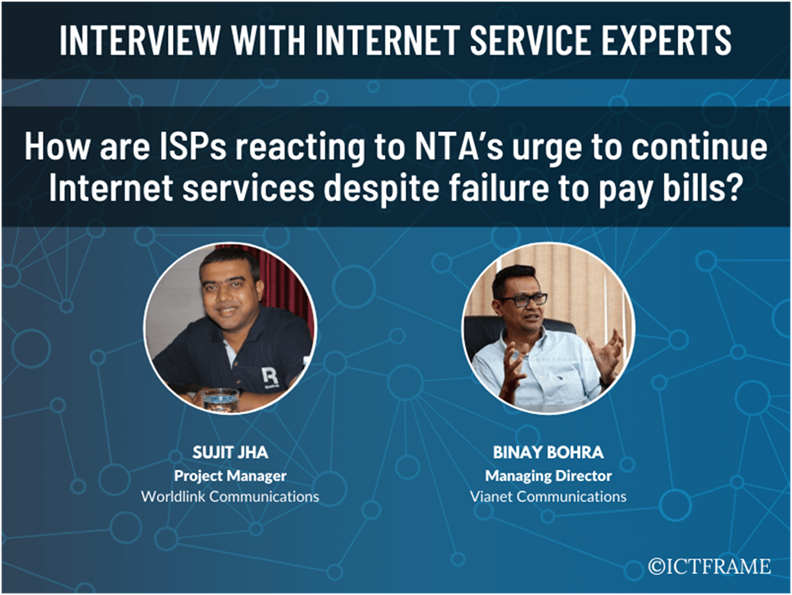How Are The ISPs Industries Providing Services During The Lockdown?
April 20, 2020, Kathmandu
Communication has become a necessity for billions of people around the globe to stay connected while in quarantine or lockdown. It is of utmost importance to make sure the information is flowing and people are getting aware of the latest updates in the crisis.
The main issue for service providers in Nepal has become the continuity of telecommunication or internet services during the lockdown.
Why?
It’s due to the surge in internet traffic that they have to make sure their service remains intact and that they focus on maintenance. Also, most consumers will be unable to pay the bills in time or not at all. With this in consideration, the Nepal Telecommunications Authority (NTA) released a notice urging ISPs not to cut the internet even if users don’t pay the internet bills.
The Internet Service Provider’s Association of Nepal (ISPAN) sent a letter to the NTA in response to this notice on April 19. ISPAN has hinted that it would be an issue for ISPs to run a business if the internet was not billed. In the letter, ISPAN also states, “It has been reported that the ISPs are providing continuous unpaid internet service to the physically challenged, elderly clients who have no helper at home.”

Here’s what Vianet and Worldlink are doing to continue their services during the lockdown.
Interview with Mr. Sujit Jha, Technical Project Manager at WorldLink Communications
Q. How is Worldlink coping with the surge in Internet usage?
A: Well, many consumers have complained that Worldlink is cutting off bandwidth during the lockdown. But I can assure you that it is not the case. In fact, we have increased the bandwidth by 25% during the lockdown. The peak hour of internet usage as of now is 7 PM to 11 PM. So our customers can watch videos online but our only request is to limit the quality to 720p if you would normally watch it on 4K or 1080p. Things like these can help manage the bandwidth during peak hours.
Q. How practical do you think is NTA’s urge to not cut the Internet even if users don’t pay bills during the lockdown?
A: I understand why NTA has urged to do so but practically speaking, it may be difficult for us to implement it. In an organization like Worldlink, people are working despite the challenges of the crisis. It needs to pay the salaries of the staff and it can’t do so if bill payments stop coming. So, it is also necessary for us to acknowledge the contributions of our staff working from home and in the field during the pandemic.

Q. It is also important to understand the challenges in Bill payment during the lockdown. So, how is Worldlink dealing with it?
A: Before NTA released the notice, we had already considered extending the payment period for customers whose subscription was about to expire. So, we are renewing the subscriptions of the users for 5-15 days on our own. Also, we are calling or informing each customer to use ATM cards or digital payment platforms like Khalti to make payments. In fact, I see an opportunity for our transaction process to go fully digital and it is in increasing trend since the lockdown.
For the ones who are unable to use any digital platform, our staff residing in the proximity can receive payments from them. We are doing our best to consider the challenges of users but at the same time, we are ensuring payment collection by encouraging transactions through digital channels.
You may also like: Will Worldlink Break the Internet?
Q. How are the support team and field workers ensuring maintenance at such times?
A: As I mentioned earlier, our staff members try to collect bill payments from users who reside in their area. Also, to ensure continuity in our service and provide maintenance, our maintenance team is equipped with PPEs (Personal Protective Equipment) and adequate safety kits.
Q. Can Worldlink be the next target of a data breach during the lockdown after the Vianet incident?
A: I wouldn’t say that there’s a 100% guarantee in our security system. The hackers have eyes to see loopholes where we normally don’t. However, talking about the data breach, there are no weaknesses in our system that I am aware of. We have upgraded our hardware and systems in the last 2-3 years with the aim to provide continuous service in a secure and reliable way. Furthermore, we have not received any information regarding a possible data breach in our system. Unlike recent data breaches, we have not received emails threatening to leak our data. So, to our knowledge, Worldlink’s data is secure.
Interview with Mr. Binay Bohra, Managing Director at Vianet Communications

Q. How has Internet usage increased during the lockdown and what has Vianet done to cope with it?
A: Previously, the peak hour used to be 7 PM – 10 PM. But now due to the lockdown, we are witnessing a new peak time at around 9 – 11 AM as well. This means that the peak hour has doubled and as a result, the load has increased. Even there is an increase in Vianet’s bandwidth by 20-25% (increase in the local bandwidth is up to 100%). Basically, the income cost has decreased while the cost of bandwidth has increased.
Initially, when the government announced a lockdown of 7 days, we decided not to disable any accounts which would expire during that time. But after the expansion of lockdown, it became difficult to hold our decision. The inability to collect bill payments would have invited new issues for us. We need to pay the salaries of our staff and keep our cash flow going.
Q. How is Vianet making sure that users pay the bill and the inability of the users to pay bills would not affect their internet services during the lockdown?
A: First of all, there are several ways to pay the bills from home. There is a provision of online bill payment through the user’s debit card as well. Similarly, users can pay bills through other digital platforms or wallets. So, we are requesting our customers to adopt digital transaction methods as much as possible. Similarly, we also opened counters at certain locations during the early stages of lockdown to help customers pay the bill. However, due to increasing risks, it hasn’t been possible currently.
We have managed to collect around 35 to 40% payment through these processes. Considering the situation of our customers, we have certain provisions for extending the grace period. Also, our team is trying to reach the ones who are unable to pay bills through any mediums. For this, our team is equipped with protective and safety kits. However, this depends on the situation and location as well.

Vianet Lockdown Notice | Current Service Status
Q. Do you agree with the announcement by NTA?
A: Well, our sole income source for our services is the bill collection. In the absence of the collection, we might be unable to continue our services to our prime. So, I believe there was a huge communication gap between the ISPs and NTA. We were concerned that the users who are perfectly able to pay bills might ignore their subscription expiry date completely at such time.
Due to such issues, we requested the NTA that we should collect the bills using digital platforms from users. And at the same time, suggest solutions to the ones who are unable to pay bills or consider extending the grace period depending on their situation. So I incline towards the possibilities of business continuity with potential solutions rather than facing consequences due to no cash flow.
Q. What challenges are the maintenance team and field workers facing due to lockdown?
A: Obviously the lockdown has affected the mobility and convenience for field support. Our primary focus is to provide continuity in our services through support and maintenance during the lockdown. There are issues like damages in cable or wires due to fire or other reasons. Similarly, there are connectivity issues in places inside and outside the Kathmandu valley.
The early lockdown stages were confusing. Eventually, we managed to get limited passes and yet some of our staff were detained and some sent back home. Due to this both customers and Vianet, as a service provider, faced difficulties to ensure field support. I have come to know of a case where the customer had no internet connection for a week. Obviously, we do our best to give maximum support but the circumstances deny us the opportunity. So, I can say that there may be delays in response time but we are ensuring our team addresses each maintenance issue.
Q. Are the field workers and staff equipped with Protective kits?
A: Yes, we have adopted social distancing and equipped our maintenance staff with PPE and safety kits. We spend every morning planning how to provide maintenance without violating the social distancing rule and at the same time, solve the issues of our customers. We make sure to record the availability of PPE gears and the status of our maintenance staff.
Q. Are there any new inquiries for Vianet’s Internet service or has Vianet installed Internet services for any new customers during the lockdown?
A: Very rarely. There probably is no new installation of our services inside Kathmandu but there are a couple of new installations outside the valley. However, our primary focus during the lockdown is maintenance rather than new installations.
More from ISPAN’s letter to the NTA
In the letter to the NTA, some points in the ISPAN statement are: ISPs are providing continuous internet service for the users who are sick and elderly having no helper at home as per the notice from NTA.
ISPs were receiving payments from some customers through digital platforms prior to the announcement of a nationwide lockdown. And now, they are requesting all customers to use digital platforms to pay for internet bills.
ISPs need to pay international internet providers for internet bandwidth. Due to the crisis and increased internet usage, the bandwidth cost has increased. Also, the ISPs need to pay for the salaries of their employees who are working hard during the crisis. So, not receiving payments could lead to business discontinuity and thus, ISPs need to collect bill payments as much as possible.
You may also like: Digital Payment Systems in Nepal
In response to the letter from ISPAN, Min Prasad Aryal, Director at NTA says, “I agree with what the letter addresses regarding the bandwidth increase and integration of digital payment systems. The notice that we had released also shines a light on the use of digital platforms to pay the internet bill.”
He adds, “We had urged ISPs to consider extending internet subscription for the ones who are unable to pay the bills. This includes the elderly, disabled, and sick people who have no helpers at home. However, the ISPs should collect bill payments from customers who are able to pay using digital platforms.”
Final Say
Looks like ISPs had already been implementing a strategy to collect bill payments from as many customers as possible. The NTA’s notice urged ISPs in Nepal not to cut off the internet access of their customers during the lockdown period. And in response, ISPAN sent a letter to the NTA highlighting the fact that not collecting bills would mean business discontinuity.
However, it seems the letter from ISPAN only addressed ISP’s continuity to provide internet access to the elderly and sick people who have no caretaker at home. Other than that, NTA itself had focused on using digital payment platforms to collect bills. Also, it would be great if people helped their friends, neighbors, and families to pay internet bills through payment platforms.






